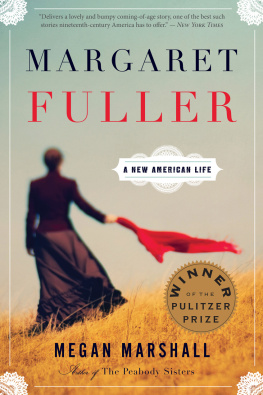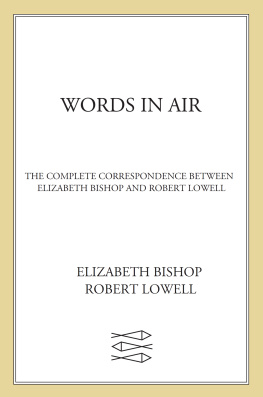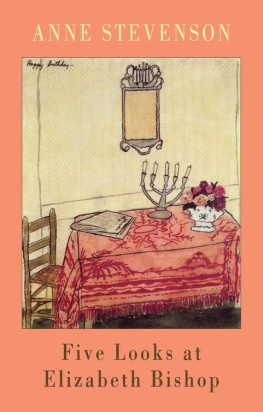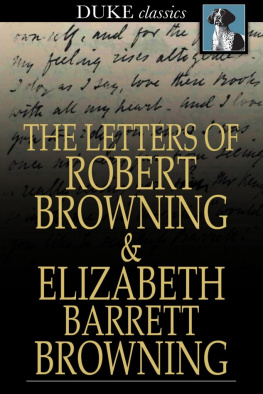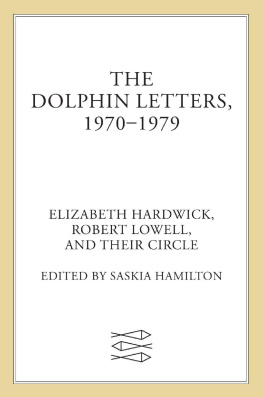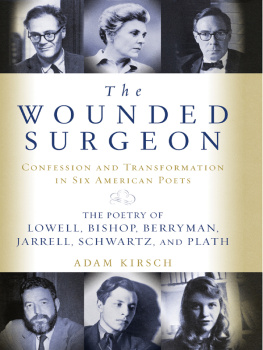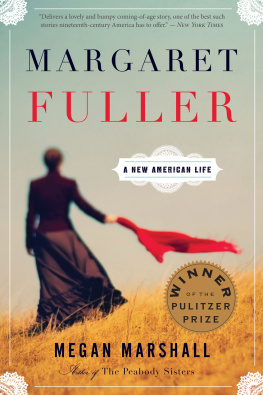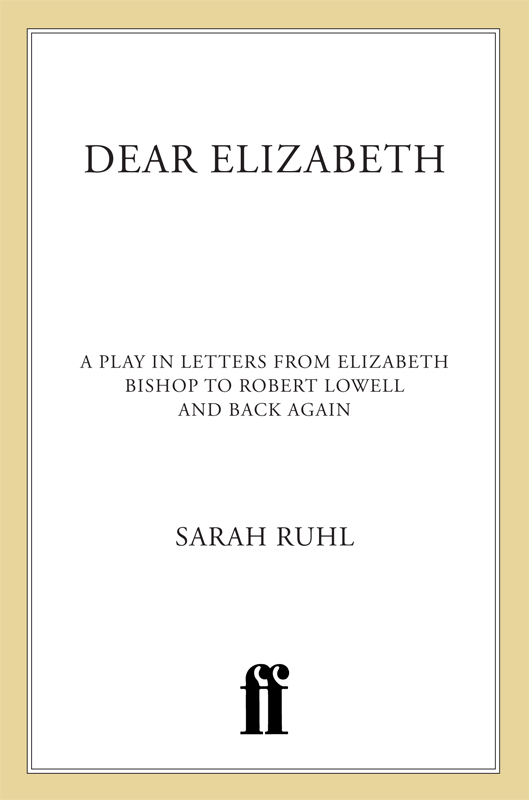Contents
Guide

The author and publisher have provided this e-book to you for your personal use only. You may not make this e-book publicly available in any way. Copyright infringement is against the law. If you believe the copy of this e-book you are reading infringes on the authors copyright, please notify the publisher at: us.macmillanusa.com/piracy.
For Elizabeth B and Elizabeth C as in Charuvastra who covered her typewriter with bandages and typed out all the poetry she could remember when she was far from home
Sometimes it seems as though only intelligent people are stupid enough to fall in love & only stupid people are intelligent enough to let themselves be loved.
Elizabeth Bishop, from her notebook
Dream
I see a postman everywhere
Vanishing in thin blue air,
A mammoth letter in his hand,
Postmarked from a foreign land.
The postmans uniform is blue.
The letter is of course from you
And Id be able to read, I hope,
My own name on the envelope
But he has trouble with this letter
Which constantly grows bigger & bigger
And over and over with a stare,
He vanishes in blue, blue air.
Elizabeth Bishop, Edgar Allan Poe & The Juke-Box: Uncollected Poems, Drafts, and Fragments
Elizabeth told me about Robert Lowell. She said, Hes my best friend. When I met him a few years later, I mentioned that I knew her and he said, Oh, shes my best friend. It was nice to think that she and Lowell both thought of each other in the same way.
Thom Gunn, Remembering Elizabeth Bishop
I can remember Cals carrying Elizabeths Armadillo poem around in his wallet everywhere, not the way youd carry the picture of a grandson, but as youd carry something to brace you and make you sure of how a poem ought to be.
Richard Wilbur, Remembering Elizabeth Bishop
While we were with her, she managed to finish North Haven, the poem [or elegy] for Lowell. She read it to us and walked about with it in her hand. I found it very moving that she felt she could hardly bear to put it down, that it was part of her. She put it beside her plate at dinner.
Ilse Barker, Remembering Elizabeth Bishop
Contents
Preface
The great poets Elizabeth Bishop and Robert Lowell were great friends, and they wrote more than eight hundred pages of letters to each other. When I was on bed rest, pregnant with twins, a friend gave me the book of their collected letters, Words in Air: The Complete Correspondence Between Elizabeth Bishop and Robert Lowell. I already had a long-standing obsession with Bishop; my obsession with Lowell and his friendship with Bishop now began. I could not put the letters down. I hungered to hear them read aloud; I particularly longed to hear letter number 161 read out loud. Number 161 is Lowells most confessional letter to Bishop, and I think, one of the most beautiful love letters ever written. In it, he says, about not asking Bishop to marry him: But asking you is the might have been for me, the one towering change, the other life that might have been had.
Reading these eight hundred pagesthese strands of two lives intersecting, rarely meetingI thought: Why do I find this narrative so compelling, even though theirs is not a story in the traditional sense? I was desperate to know how the story would come outhow each life would progress, how the relationship would end. But I also loved how the letters resisted a sense of the usual literary storyhow instead they forced us to look at life as it is lived. Not neat. Not two glorious Greek arcs meeting in the center. Instead: a dialectic between the interior poetic life and the pear-shaped, particular, sudden, ordinary life-as-it-is-lived.
Life intrudes, without warning. Bishops great love and partner, Lota, commits suicide without warning. Bishop has multiple asthma attacks, and often needs to be hospitalized for alcoholism and depression. Lowell dies suddenly of a heart attack in a taxicab en route to see his ex-wife Elizabeth Hardwick. As he died in the taxi he held a painting of his third wife, painted by her ex-husband, Lucian Freud. Lowell had bipolar disorder and often found himself quite suddenly in a sanatorium. Bishop and Lowells carefully built, Platonic poetic worlds are intruded on constantly by the vagaries of life and the body. And through such sudden disturbances, their letters were like lanterns sent to each other across long distances. Bishop lived in Brazil most of her life, and Lowell lived in New York, Boston, and London. Their friendship was lived largely on paper, though they met up at crucial times in their lives.
Bishop was in New York when Lota committed suicide, and she stayed at Hardwick and Lowells apartment. They paid for her ambulance ride through Central Park, the result of a bad fall she took, perhaps induced by too much drink, after Lotas suicide. Bishop was plagued her whole life by alcoholism; at one point a friend eliminated all the liquor in her house and Bishop was reduced to drinking rubbing alcohol and ended up in the hospital. Lowell visited Bishop in South America and was hospitalized in Argentina for a manic episode.
Their correspondence spans political epochscoups in Brazil, the Vietnam Warpersonal epochs, and literary epochs. Bishop observes Lowells trajectory as he creates the confessional movement in poetry. There is, in the letters, an extraordinary dialectic between Lowells more confessional mode and Bishops formal restraint. Her skeptical attitude toward the confessional, however, didnt keep her from loving Lowells poetry. They both carried each others poems in their minds and in their pockets. Lowell carried Bishops The Armadillo (a poem she dedicated to Lowell) in his wallet, a kind of talisman. Lowell wrote Skunk Hour for Bishop, as well as many sonnets and a poem called Water, about a seminal weekend the two of them spent in Maine.
After Lowell divorced Jean Stafford in July 1948, he visited Bishop in Maine. Its a visit they would both return to again and again in their letters and in their poetry. Its impossible to reconstruct exactly what happened; we know from letters and poems that they spent the weekend together, at one point standing waist high in water, and Bishop said to Lowell, When you write my epitaph, you must say I was the loneliest person who ever lived. Bishop wrote later that they were: Swimming, or rather standing, numb to the waist in the freezing cold water, but continuing to talk. If I were to think of any Saint in his connection then it is St. Sebastianhe stood in a rocky basin of the freezing water sloshing it over his handsome youthful body and I could almost see the arrows sticking out of him.
We know that shortly after that visit, Lowell told some friends he was going to marry Bishop. Soon after, they had a drunken weekend at Bard where many poets were gathered. Lowell was rumored to have proposed to Bishop that weekend. Bishop wrote to another friend, Saturday night was worsta really drunken party, Im afraid, with everyone behaving very much the way poets are supposed to. In another account, Bishop remembers that she and Hardwick had helped a drunken Lowell back to his room, taken off his shoes and tie, loosened his shirt, upon which Hardwick said, Why, hes an Adonis! and Bishop said, from then on I knew it was all over.
We also know from their friend Joseph Summers that at the end of the Bard weekend, He and Elizabeth seemed to be very much in love He was saying, Now let me know when you are coming back. And she said, I dont know. Let me know where you are, and so on. Another friend reports, She told us at one point she loved Cal more than anybody shed ever known, except for Lota, but that he would destroy her. And from another friend: Lowell was one of the few people Bishop addressed in her poems. She said that he had proposed to her, and she had turned him down. Apparently her greatest regret was not having a child, and she considered having one with Lowell early on, but worried about the history of mental illness in both of their families.


